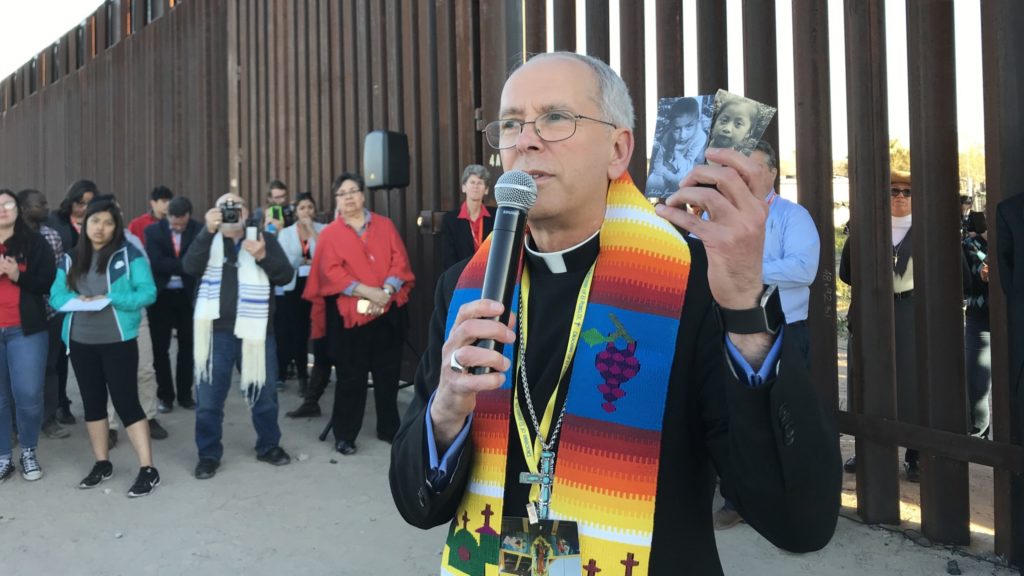Texas Catholic and community groups are holding an event in El Paso called "Do Not Be Afraid: March and Vigil for Human Dignity" the evening of March 21 in the wake of what organizers called "dehumanizing laws and policies" toward migrants in the Lone Star State.
Organizers called the event "a decisive moment of community resistance and prayer" in response to the passage of Senate Bill 4, a controversial law that makes it a state crime for unauthorized migrants to cross into Texas from Mexico; Texas Attorney General Ken Paxton's lawsuit seeking to shut down Annunciation House, a Catholic nonprofit serving migrants; and the first anniversary of a fire that killed 40 people in immigration detention across the border from El Paso in Ciudad Juárez, Mexico, and injured about two dozen others.
The event, organizers said, is intended to "affirm our welcoming borderland identity, protect our freedom to put faith into action, lift up the rights and dignity of those who migrate, defend our humanitarian workers, (and) commemorate those dying at the border."
Bishop Mark J. Seitz and Auxiliary Bishop Anthony C. Celino of El Paso and other "faith and community leaders from across the borderlands" host the event, which starts at 6:30 p.m. at San Jacinto Plaza, where participants will meet and then march to Sacred Heart Church for the vigil at 7 p.m.
Paxton's suit targeting El Paso's Annunciation House, as well as Texas' passage of SB 4, comes as some Republicans have grown increasingly hostile toward nongovernmental organizations, including Catholic ones, that provide resources such as food and shelter to migrants at the U.S.-Mexico border.
A state judge March 11 temporarily blocked the Texas attorney general's demands for the records of Annunciation House, indicating both that Paxton's effort seemed politically motivated with a "predetermined" outcome in mind, and that it must go through appropriate due process in the state court system.
Paxton in February filed suit in an attempt to shut down Annunciation House, accusing it of "human smuggling," in a move denounced by Catholic immigration advocates, including Bishop Seitz.
Meanwhile, the 5th U.S. Circuit Court of Appeals issued a decision late March 19 once again blocking Texas from enforcing SB 4. Earlier the same day, a divided U.S. Supreme Court lifted its temporary pause on the law and sent the matter back to the federal appeals court, which in effect briefly allowed the state to enforce the law while litigation proceeds.
Federal law already makes it illegal to enter the U.S. without authorization, and most portions of a similar 2010 Arizona law were later struck down by the Supreme Court. Immigration advocacy groups in Texas filed a lawsuit over the bill prior to the Justice Department's challenge.
In a statement about SB 4 emailed to OSV News, Jennifer Carr Allmon, executive director of the Texas Catholic Conference of Bishops, said, "The church supports the right of a sovereign nation to control its borders. We want the federal government to enact effective and humane border management as part of a framework of comprehensive immigration reforms. All law enforcement agencies can and should cooperate with each other but should not take over each other's responsibilities or jurisdiction."
"The obligation to control the international border lies with federal authorities," Carr Allmon continued. "We understand the situation at the border has become untenable, but this law is not the solution. We advocate for immigration and refugee policies that protect family unity and allow newcomers an opportunity to contribute and participate more fully in our communities."
"Targeted, humane and proportional border security policies are also a critical part of addressing the broken immigration system in the United States," she said. "We extend our prayers to our brothers and sisters experiencing the harsh realities of this journey, and for all who encounter them. We ask all people of goodwill to join us in praying and working for a secure border, to protect the vulnerable and for just immigration solutions to protect all human life."
The Hope Border Institute, a group that works to apply the perspective of Catholic social teaching in policy and practice to the U.S.-Mexico border region and is one of the partners organizing the El Paso event, wrote in a post on social media, "Thank you to our incredible partners for joining us for "Do Not Be Afraid: March & Vigil for Human Dignity."
"Join us in our commitment to creating a community of respecting human dignity. We hope to see you there!" the post said.

